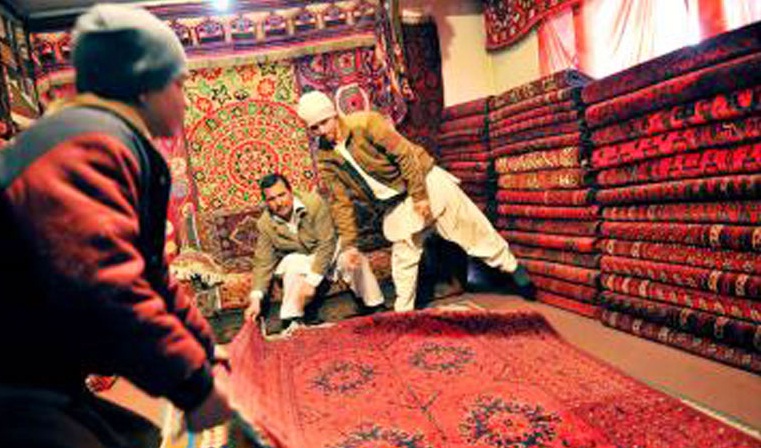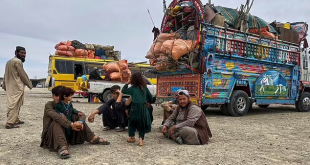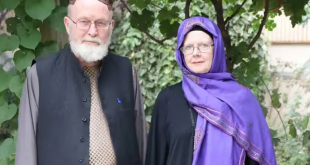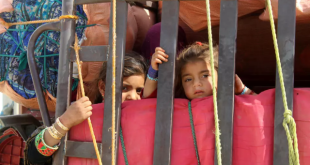Under a tripartite agreement between Pakistan, Afghanistan and UNHCR, Afghan refugees are now allowed to stay in Pakistan till Dec 31
PESHAWAR: With the Afghan carpet weavers leaving as Pakistan pushes for repatriation of Afghans, local and Afghan carpet traders and manufacturers are concerned that the carpet industry here would collapse without skilled workers.
Peshawar’s fabled carpet markets are already beginning to wear a deserted look because the local carpet-industry is almost entirely manned by Afghan artisans. Among them is Dawood Ahmadi, an Afghan carpet manufacturer and exporter.
“90 percent of the carpet weavers in Khyber Pakhtunkhwa are Afghans,” Ahmadi told News Lens. “With the fast-approaching deadline to leave Pakistan and constant harassment from police they are all leaving.”
The Pakistan government has adopted a tough stance on Afghan refugees in the wake of December 2014 terrorist attack on the Army Public School (APS) that left more than 140 children dead. The attack was masterminded and claimed by terrorists based in Afghanistan.
Among the 20 points of National Action Plan devised after the APS attack to fight terrorism, one deals with a comprehensive policy for registration of Afghan refugees.
Afghan refugees first came to Pakistan in early eighties after Russian intervention in Afghanistan. Even after the Russian pullout from Afghanistan, it has remained unstable and refugees’ influx into and repatriation from Pakistan has continued through the different stages of peace and conflict. Through the three decades of instability in Afghanistan, Pakistan has hosted more than 3 million Afghan refugees.
The carpet-weaving industry in Pakistan, especially in the border provinces of Khyber Pakhtunkhwa (KP) and Balochistan, dates back to that time when the migration of Afghan citizens to Pakistan brought many skilled workers, among them carpet weavers.
Ahmadi who is from Mazaar Sharif in Afghanistan, came to Peshawar in the eighties when he was only eight. He had learnt carpet weaving back home when the war happened and he and his family had to seek refuge in Pakistan.
He said among the Afghan ethnic groups who run the local carpet industry, 70 per cent of the carpet-weavers are Turkman and the rest are Uzbek, Hazara and Pashtun. “12 out of the 17 carpet markets in Peshawar’s Khyber Bazar entirely shifted to Afghanistan during the rule of Hamid Karzai,” said Ahmadi, “when his government offered many incentives to them.”
Under a tripartite agreement between Pakistan, Afghanistan and United Nation High Commissioner for Refugees (UNHCR), Afghan refugees are now allowed to stay in Pakistan till December 31, 2016. According to UNHCR currently 1.5 million afghan refugees residing in Pakistan, while from 2001 onwards more than 3.9 million repatriated to Afghanistan.
Ahmadi said in last few months, 10 to 15 per cent of the skilled labour had left for Afghanistan while others were planning to leave the country soon after Eid Ul Azha – the Muslim feast of sacrifice. “However, it is not easy for us to leave Pakistan and wind up our businesses in the stipulated time. We ask the government to extend the stay of skilled labor associated with the carpet industry in Pakistan.”
Mumtaz Khan, Director Carpet and Rugs Development Company, said due to the tense relations between Pakistan and Afghanistan in recent months, they had been reluctant to advocate for the stay of Afghan skilled labour and businessman.
“We waited for the dust to settle down and now it is time to raise our voice for them,” said Khan. “In the last one decade, carpet exports from KP have declined from $55 million to $6 million. In the coming days, it may further shrink to an alarming extent.”
Khan says repatriation of Afghan refugees would only affect Khyber Pakhtunkhwa. The carpet industry in Punjab will remain stable because it engages local skilled labour.
Khan called on the government to provide work permits or multiple visit visas to Afghan skilled weavers and manufacturers. To him such as move would not be unprecedented because skilled labour and investors are encouraged by governments all over the world. “The government needs to look into the situation from a broader perspective.”
Apart from KP, the carpet and rug industry of the country as a whole is on a downward spiral, says Pakistan Economic Survey report for 2015-16. “During July-March Financial Year 2016, carpets and rugs worth $74.027 million were exported from Pakistan compared to $92.924 million previous year, showing a decrease of 20.34 per cent. While in quantity term the export of carpet and rugs decreased by 26.53 per cent.”
According to Mazharul Haq, Chairman Export Standing Committee KP Chamber of Commerce, the fall of carpet and rug industry in KP is mainly due to Afghan repatriation.
“Now they are transferring this art to their country of birth as the carpet industry in Afghanistan takes roots again. Unfortunately, Pakistanis never showed interest in learning or transferring this art locally and the industry is entirely dependent on Afghans.”
Haq said there were 10 thousand people associated with the carpet industry in KP. Among main importers and buyers of carpet and rugs from Pakistan, he said, were Germany, Africa, Europe and United States.
Sherzai, an Afghan carpet weaver, said the price of a carpet varies from PKR 2000 per square metre to PKR 30,000 per square metre, depending on the number of knots and the quality of wool used. According to him, a carpet of eight square metres takes one and half to three months to complete and another 15 days to add finishing touches.
According to the provincial head of Small and Medium Term Enterprise Development Authority (SMEDA) Javid Iqbal Khattak, the local carpet and rug industry were always prone to two main challenges: Limited stay of the refugees in Pakistan and environmental concerns of authorities related to the industry.
He said the government failed to transfer carpet weaving skills to local people by providing proper training. In 2008, after a SMEDA feasibility report, the provincial government allocated PKR 100 million to the Carpet Nagar project, said Khattak, but it never saw light of the day. “Carpet Nagar was an industrial cum residential project designed in view the nature of industry which is mostly home based.”
According to Khattak, the environment of Peshawar is best suited for carpet industry. “Its water is good for carpet washing and dyeing, which is why even carpets from Afghanistan are brought here for finishing. The government needs to provide proper attention to the industry as soon as possible. It should provide work permits to skilled labour – a proposal once under consideration when Owais Ahmad Ghani was the governor of KP but never realized.” (dailytimes)
 Afghanistan Times
Afghanistan Times




